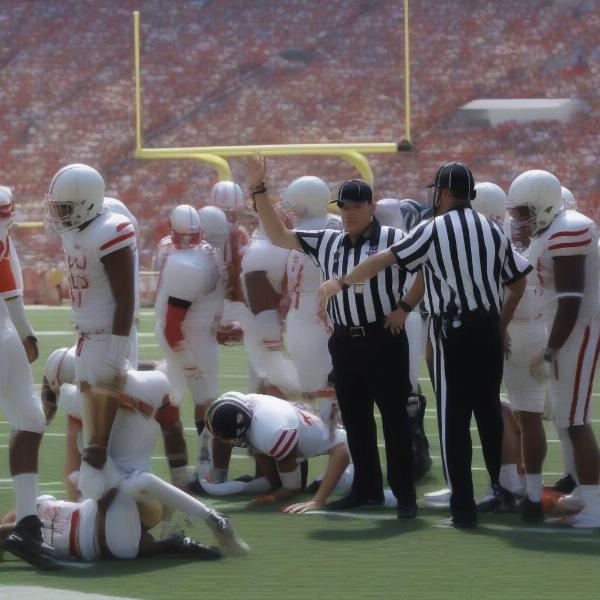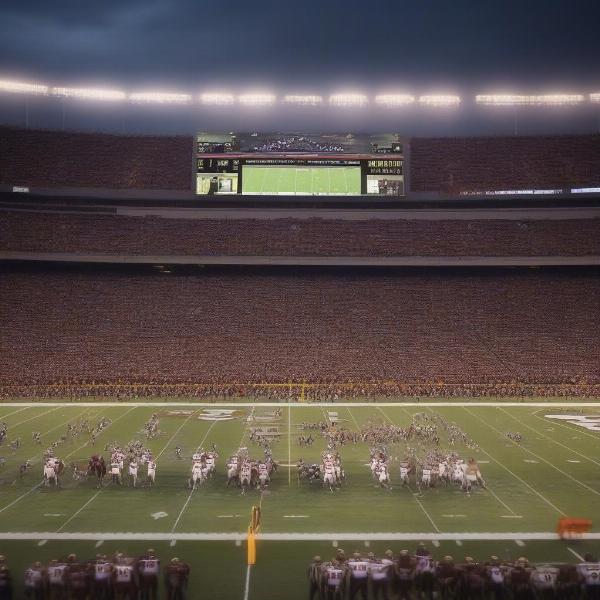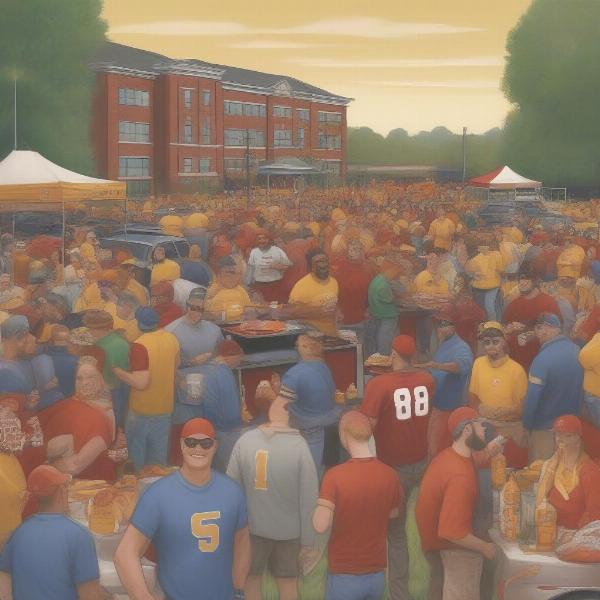A college football game is a significant time commitment, often exceeding the timeframe of other sports. Many factors influence the actual duration of a college football game, making it difficult to pinpoint an exact time. So, just how long is a college football game? Let’s explore the intricacies of college football game length and the elements that contribute to its sometimes unpredictable duration.
Understanding the typical length of a college football game requires looking at several factors, from scheduled game length to the elements that can extend a game. For the average viewer planning their Saturday, or for those attending their first live college football game, it’s helpful to have a general idea of the time commitment.
Breaking Down the Average College Football Game Time
While a college football game is scheduled for 60 minutes of regulation play, spread over four 15-minute quarters, the reality is that the clock rarely runs continuously. Numerous stoppages interrupt the game flow, extending the total time significantly. These stoppages include incomplete passes, penalties, timeouts, injuries, and halftime. A typical college football game can last anywhere between three and four hours.
On average, a college football game will run for approximately 3 hours and 12 minutes. This figure encompasses the entire game experience, from kickoff to the final whistle, including halftime. However, this is simply an average. Games can be significantly shorter or longer, depending on the specific circumstances.
After the first two quarters of play, there’s a halftime break, typically lasting around 12-15 minutes, allowing bands to perform and teams to regroup. This intermission adds considerably to the total game length.
 College Football Game Clock Stoppage
College Football Game Clock Stoppage
Factors Influencing College Football Game Length
Several factors contribute to the fluctuating length of college football games. Understanding these elements will give you a better sense of what to expect when attending or watching a game.
- Number of plays: High-scoring games or those with many offensive possessions tend to be longer due to the increased number of plays run.
- Penalties: Penalties cause clock stoppages, adding to the overall game time. A game with numerous penalties will inevitably be longer.
- Timeouts: Each team has a limited number of timeouts, which are strategic pauses in the game. Using these timeouts strategically can lengthen the game, especially in the closing minutes.
- Injuries: Player injuries, unfortunately, can cause delays and extend game time as medical personnel attend to the injured player.
- Television Timeouts: For televised games, commercial breaks, known as television timeouts, are inserted at various points, adding to the overall broadcast time. These aren’t as prevalent in non-televised games.
- Overtime: If the score is tied at the end of regulation, the game goes into overtime. College overtime rules are different from the NFL, with each team getting a possession starting at the opponent’s 25-yard line. Each overtime period adds significantly to the overall game length.
A close game, especially one going into overtime, can easily push the total time to four hours or more. For instance, thrilling overtime battles can create unforgettable moments but also contribute significantly to a much longer game experience.
 College Football Overtime Scenario
College Football Overtime Scenario
Planning Your Game Day Around College Football
Knowing the potential duration of a college football game allows for better planning and management of your day. If you’re attending a game, factor in travel time, parking, and entry into the stadium. For those watching from home, be prepared for a multi-hour commitment.
It’s always wise to allow a buffer when scheduling activities after a college football game. Just like the question of how much are the sec championship game tickets, game length is a significant consideration for attending a live game. Similar to how long do football games take in other leagues, college games require a flexible schedule. You might want to check what time is the ga fl game or what network is the alabama football game on to coordinate your viewing schedule effectively.
 College Football Fans Tailgating
College Football Fans Tailgating
Related Insights: Game Length in Other Contexts
While focusing on college football, it’s helpful to understand game durations in other football contexts. You might be interested in comparing the average college game length to how long do football games take at the professional or high school level. Understanding these variations provides a more complete perspective on the time commitment associated with different football levels. For instance, knowing what is the score in the clemson game can influence your viewing choices if you’re interested in shorter or longer game experiences.
Conclusion
So, how long is a college football game college level? While the scheduled time is 60 minutes, the actual duration often falls between three and four hours due to various stoppages and halftime. Factors like the number of plays, penalties, and timeouts can significantly impact a game’s length. Understanding these elements helps fans and viewers prepare for an enjoyable and well-planned game day experience, whether watching from the stands or at home.
FAQ
-
What is the average length of a college football game? The average game lasts around 3 hours and 12 minutes.
-
Why do college football games take so long? Frequent stoppages like incomplete passes, penalties, timeouts, and halftime contribute to the extended game length.
-
How long is halftime in college football? Halftime typically lasts 12-15 minutes.
-
Do all college football games last the same amount of time? No, the length can vary significantly due to factors influencing the flow of the game.
-
What happens if a college football game is tied after regulation? The game goes into overtime, with each team receiving a possession.
-
How can I find out the start time of a specific college football game? You can consult sports websites, TV listings, or team schedules.
-
Are televised college football games longer than non-televised games? Televised games often include commercial breaks (television timeouts), adding to the overall broadcast time.

